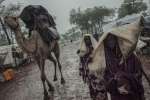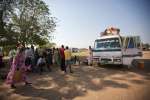- Text size
 |
|  |
|  |
| 
- Français
UNHCR alarm on health risks for refugees in South Sudan
Briefing Notes, 10 July 2012
This is a summary of what was said by UNHCR spokesperson Adrian Edwards – to whom quoted text may be attributed – at the press briefing, on 10 July 2012, at the Palais des Nations in Geneva.
Conditions in South Sudan's refugee camps have continued to worsen over the past few days under the strain of continuing large refugee inflows and flooding from torrential rains. The health situation has at this point become UNHCR's priority concern, and we are watching closely for possible outbreaks of disease.
Health actors and the UN refugee agency are undertaking a mass health screening to obtain better data on the actual mortality rates and vaccination coverage rates across all refugee sites in South Sudan's Upper Nile and Unity States. These surveys are still not complete. In light of the weak state of the population on arrival, large scale programmes are required to immediately address their needs and prevent people's health from deteriorating further. In remote places such as the borders of Unity and Upper Nile states, the challenge for us is equaled by very few other situations in the world. Massive health outreach and intensive hygiene and sanitation programmes are needed to mitigate the threats to the health of refugees.
In Yida settlement close to the Southern Kordofan border, in Unity state, new arrivals have doubled the refugee population since early May to close to 60,000 persons. While UNHCR is conducting verification of numbers, congestion in a limited strip of land already cut-off by rains creates a further health challenge. Last week saw a sharp increase of bloody diarrhea cases has been reported by health actors working there. To address this and secure clean and sufficient drinking water, more wells are being drilled and additional drilling teams brought to the scene. UNHCR is also distributing this week thousands of jerry cans and buckets to all families with children under five. Additional amounts of chlorine are being used at water points. Efforts are also under way by all actors to increase awareness among the mostly young refugee population about hygiene, health and nutrition risks.
The most critical challenge for us and all partners working there is to provide enough clean water for all refugees and prevent diseases in this remote and fragile part of South Sudan.
In Maban county of Upper Nile State, hosting now over 110,000 refugees from Blue Nile State in Sudan water has also been a critical challenge. Aid agencies have progressed in securing water through drilling and trucking to refugee sites. Four drilling rigs are operational and drilling efforts are continuing while most of the refugee population from Jammam is being relocated to other sites because of clean water shortages there combined with localized flooding. While refugees were initially reluctant to move, community mobilization efforts are producing positive results. UNHCR has worked and continues to work with local authorities to identify more sites with reliable water sources to ease pressure on existing refugee settlements and accommodate expected new arrivals. Due to torrential rains and flooding the few existing roads are largely impassable, slowing the delivery of assistance. Moving this life-saving equipment by helicopter is also being considered, but a lack of funds is hampering this effort.
Since last December UNHCR has delivered emergency supplies to South Sudan by air and by road. This includes 16,400 family tents, and essential relief items for 130,000 people including plastic sheets, sleeping mats, blankets, mosquito nets, jerry cans and kitchen sets.
UNHCR's revised appeal for Sudanese refugees in Ethiopia and South Sudan amounts to US$ 219.9 million. By beginning of July the UN refugee agency has received US$45.9 million (US$11.6 million for Ethiopia and US$33.6 million for South Sudan), representing less than 21 per cent of estimated needs.
For further information on this topic, please contact:
- In Juba: Terry Ongaro on mobile: +211 927 770 040
- In Geneva: Adrian Edwards on mobile +41 79 557 91 20
- Andrej Mahecic on mobile +41 79 200 7617



























































